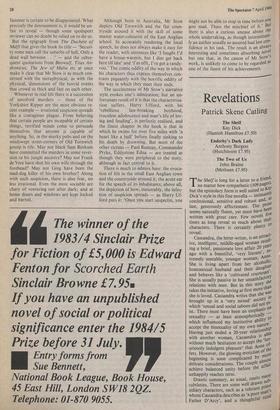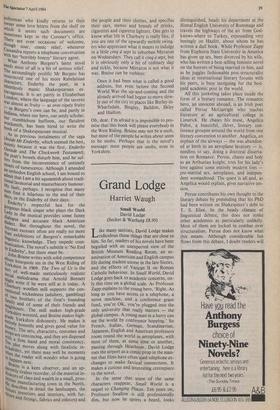Revelations
Patrick Skene Catling
he Shelf is long for a letter to a friend, I no matter how sympathetic (109 Pages)'
but the epistolary form is well suited to Kay
Dick's style in this fine novella intimately confessional, sensitive and robust and, at last, generously affectionate. The prose seems naturally fluent, yet must have been written with great care. Few novels five times as long reveal so much about their characters. There is certainly plenty to reveal. Cassandra, the letter-writer, is an attract- ive, intelligent, middle-aged woman real'. ing a brief, passionate love affair 20 Years ago with a beautiful, 'very literate', ex- tremely unstable, younger woman, Anne' She is living apart from her alcoholic, homosexual husband and their daughter, and behaves like a 'cultivated courtesan is She s usually passive in her unsatisfactorY relations with men. But in this story she takes the initiative, loving at first more than she is loved. Cassandra writes that she Nva.s brought up in a 'very mixed' society 10 which 'sexual and social taboos did not ex- ist. There must have been an emphasis on sexuality — at least atmospherically which influenced my instinctive ability to accept the bisexuality of my own nature: Having just ended a 20-year relationsh1P with another woman, Cassandra is able without much hesitation to accept the `Itti
n
uously indulgent pleasure' that Anne 0,,,e fers. However, the glowing eroticism of We beginning is soon complicated by more delicate considerations. The couple ahltaaffafr achieve balanced unity before the unhappily reaches term. Drastic summary, as usual, omits many _ subtleties. There are some well drawn s.ti t sidiary characters, such as a tolerant One!, whom Cassandra describes as 'a poor Ivan ; Father D'Arcy', and a thoughtful NO'
Policeman who kindly returns to their owner some love letters from the shelf on
which it seems such documents .are sometimes kept in the Coroner's office. There are even occasions of welcome, though sour, comic relief, whenever Cassandra reports a telephone conversation with her 'horribly breezy' literary agent. What Anthony Burgess's latest novel needs most of all is a bit of serious relief. The astoundingly prolific Mr Burgess has resurrected one of his more Rabelaisian Characters, Enderby the poet, in a relentlessly manic Shakespearean ex- travaganza. It is set partly in Elizabethan London, where the language of the taverns was almost as fruity — as over-ripely fruity as Burgess's own can be, and partly in Indiana, where our hero, our seedy scholar, our stumblebum buffoon, our flatulent wordsmith, has been hired to write the book of a Shakespearean musical. , As in previous instalments of the saga Onside Mr Enderby, which seemed the best, mainly because it was the first, Enderby Outside and The Clockwork Testament), the Poet's bowels disturb him, and he suf- fers from the inconvenience of untimely (Insets of tumescence. Although 1 attended an orthodox English school, I am bound to admit that I am a bit squeamish about tradi- tional lavatorial and masturbatory humour. MY fault, perhaps. I recognise that many Ten find it hilarious to the end of their 'aYs, or the Enderby of their days. Enderby's respectful lust for the gorgeous black singer who plays the Dark di ,Yin the musical provides some funny d!a:°gue and accurate black American j'atect. But throughout the novel, the tea excesses of are no more ,"an exn hibitions often Burgess's (remarkable linguistic knowledge. They impede com- munication. The novel's subtitle is 'No End 43 Enderby', but there must be. „, John Braine writes with solid competence 41,00ut bourgeois sin in the West Riding of Yorkshire in 1969. The Two of Us is the s°,,rt. of well-made meticulously realistic rliTeloi melodrama that Arnold Bennett ,,!ght Write if he were still at it today. A ,■;nar.bury woollen mill supports the con- oefIffonal wickedness (adultery, gambling) two brothers of the firm's founding ramily and of some of their friends and 8nejghb°urs. The mill makes high-grade rorkshire worsted, and Braine .makes high- e,,a,de Yorkshire dishonesty. He makes it entirely honestly and gives good value for p:311eY. The sets, characters, costumes and w.°13s are convincing, and they are disposed ThitFil a firm hand and moral consistency. evvbit'abl3ilinitf moves along with fatalistic in-
Y, yet there may well be moments
i4 in- when the reader will wonder what is going i?Pl'en next. raine is a keen observer, and an ap- parently tireless recorder, of the material in- di`gt
ors of class and dwealth in a small, pros-
er°us manufacturing town in the North. iko describes in detail the landscapes, the .:.uses (exteriors and interiors, with fur- .,iture and fittings, fabrics and colours) and the people and their clothes, and specifies their cars, menus and brands of drinks, cigarettes and cigarette lighters. One gets to know what life in Charbury is really like, if you are one of the upwardly mobile swing- ers who appreciate what it means to indulge in a little cinq a sept in suburban Mirraton on Wednesdays. They call it cinq asept, but it is obviously only a bit of ordinary slap and tickle, because Mirraton is not what it was. Braine can be ruthless:
Once it had been what is called a good address, but even before the Second World War the up-and-coming and the already arrived had begun to move slow- ly out of the city to places like Burley-in- Wharfedale, Bingley, Baildon, Ilkley and Hailton.
Oh, dear. I'm afraid it is impossible to pro- mise that this book will please everybody in the West Riding. Braine may not be a snob, but most of the people he writes about seem to be snobs. Perhaps that is the novel's message: most people are snobs, even in Yorkshire.











































 Previous page
Previous page